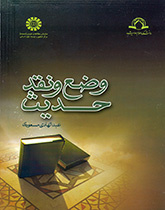
The Hadith Fabrication and Criticism
After the Holy Quran, hadith is regarded as the most significant source of acquiring religious knowledge as a guiding line for those who step into the path toward salvation and perfection. It also played a key role in all aspects of the Muslims' lives.
The Infallible Imams (a footnote is needed) were among the first critics of the deeds and words of the Holy Prophet of Islam and their own's. They were witnessing the process of fabricating forged hadiths and its consequent detriments. For this very reason, they took decisive actions to challenge forging hadiths and also the forgers. In this way, they made great effort to teach and assist their disciples and the narrators of their teachings. This was the main reason behind compiling the present book.
The book is presented in two different chapters, one to give a general picture of hadith state, and the other to deal with hadith critiques. In the first chapter, the author provides a comprehensive description of the background, different methods, and the various motives behind forging hadith and the way to confront this phenomenon as well. In the following chapter, (s)he investigates the eternal criteria inherited from the Infallible Imams (AS) in this regard.
The first chapter of the book consists of four sections. After providing an explanation of the hadith generalities, the author defines its meaning, introduces authentic-like and unauthentic-like hadiths and their differences, gives an explanation of the procedure of narration and dissemination of forged hadiths, and finally deals with the resulting damages of this trend. The first signs of forging minor hadiths were observed right after the demise of the Holy Prophet (SAW). The ruling caliphate system felt a need for a pretext in order to deny the issue of 'inheriting from the Prophet' by attributing the forged hadiths to the Prophet or through manipulating the authentic hadiths received from him. Within the first three decades after the demise of the Holy Prophet, there was no appropriate ground to issue hadith, due to the severe control the ruling system kept on recording and widespread dissemination of hadith. It was due to the fact that there was not such a possibility to record and narrate a great number of genuine hadiths. With reference to the different hadiths and historical documents; the author further considers the political incentive as the main reason for creation of such circumstances. Since the ruling systems required to be considered as a legal and accepted entity, the rulers made great efforts to inspire their followers. To win people's support and satisfaction, they took active steps to forge hadiths to their own benefits. The fabricated hadiths, then, forged with political intentions worth to be examined from social and cultural viewpoints, which are dealt with in the present book in detail.
In the second chapter, readers are introduced with the meaning and significance of hadith critique. Actually, hadith critique dates back to the birth of hadith dissemination or even earlier times. The different types, criteria and achievements of the critique and also its pathology have provided great chances for negotiations and discussions. While hadith critique is an independent subject of inquiry per se, it can be used as a clue to distinguish forged hadiths through providing some hints and criterions. With contrasting these hadiths with dubious ones, it is also helpful to find and identify forged hadiths. In this part, the author further explains the meaning, significance, and history of hadith critique, the external and internal instances of critique, and finally achievements and pathology of the critique, respectively.
Proposed for students of theology, including Quran and Hadith studies for their "Hadith Critique" and "Topical Hadiths" courses and also an appropriate source for students at their doctoral degree in Quran and Hadith studies for their "Topical Hadiths" course, this book is compiled to challenge forging hadiths and also the forgers by giving a general picture of hadith state and dealing with hadith critiques.
Highly-Praised in the 9th Book of the Season Award, Summer of 2009




